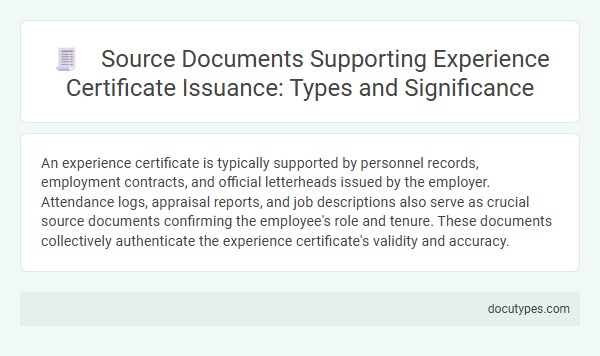An experience certificate is typically supported by personnel records, employment contracts, and official letterheads issued by the employer. Attendance logs, appraisal reports, and job descriptions also serve as crucial source documents confirming the employee's role and tenure. These documents collectively authenticate the experience certificate's validity and accuracy.
Introduction to Experience Certificate Source Documents
Experience certificates serve as official proof of your work history and skills acquired during employment. Issuing these certificates requires accurate source documents to verify your experience.
The primary source documents supporting an experience certificate include appointment letters, salary slips, and attendance records. These documents provide authentic evidence of your tenure and job role within the organization.
Importance of Source Documentation in Certificate Issuance
Source documents are essential for validating the authenticity of an experience certificate. They provide verifiable evidence that supports your professional experience and employment history.
- Verification of Employment - Source documents such as pay slips, appointment letters, and HR records confirm your tenure and role within the organization.
- Credibility Enhancement - Authentic source documentation increases the trustworthiness of the experience certificate issued, making it more valuable for future employers.
- Legal Compliance - Retaining proper source documents ensures that experience certificates comply with company policies and labor laws, protecting both the employer and employee.
Common Types of Source Documents for Experience Verification
Experience certificates are issued based on verified source documents that validate your employment history. Common types of source documents include appointment letters, salary slips, and attendance records. These documents provide concrete evidence to support the authenticity of the experience certificate.
Employment Contracts: Foundational Proof of Service
| Source Document | Description | Importance in Experience Certificate Issuance |
|---|---|---|
| Employment Contract | A formal agreement between the employer and employee outlining job role, responsibilities, and terms of employment. | Serves as foundational proof of service, verifying the candidate's employment period, position, and job conditions, which are essential details reflected in the experience certificate. |
| Pay Slips and Salary Records | Documents detailing monthly compensation and benefits during the tenure. | Support confirmation of active employment and salary consistency, reinforcing the authenticity of the experience certificate. |
| Attendance and Work Logs | Records of daily attendance, work hours, and project assignments. | Provide evidence of work tenure and active participation, further validating Your employment claims in the experience certificate. |
| HR and Management Approvals | Internal approvals or acknowledgments verifying employment correctness and certificate issuance. | Ensure the legitimacy of the experience certificate by confirming details against official records and policies. |
Salary Slips and Pay Stubs as Supporting Evidence
Salary slips and pay stubs serve as critical source documents supporting the issuance of experience certificates. These documents provide verified proof of employment duration and salary details.
- Salary Slips - Monthly salary slips detail the exact earnings and employment period of the employee.
- Pay Stubs - Pay stubs function as official records confirming salary payments and employment status.
- Verification Purpose - These documents help verify the authenticity of the experience certificate by reflecting accurate employment data.
Employers rely on salary slips and pay stubs to ensure the credibility of the experience certificate issued to employees.
Role of Appraisal and Performance Reports
Source documents crucial for issuing an experience certificate prominently include appraisal and performance reports. These reports provide verified details on an employee's job responsibilities, skills, and achievements during their tenure. Organizations rely on these documents to ensure the accuracy and authenticity of the experience certificate issued.
Relieving and Resignation Letters: Their Significance
Experience certificates are official documents issued by an employer verifying an employee's tenure and job role. Relieving and resignation letters serve as critical source documents supporting the issuance of these certificates.
Relieving letters confirm that an employee has formally left the organization and completed all exit formalities. Resignation letters provide proof of the employee's intent to leave and the notice period served. Both documents establish the authenticity and timeline required to process an experience certificate accurately.
Reference Letters and Supervisor Testimonials
Source documents play a crucial role in validating an experience certificate. Reference letters and supervisor testimonials are commonly used to support the issuance of such certificates.
- Reference Letters - These letters provide third-party confirmation of an employee's skills, work ethics, and achievements from previous employers or colleagues.
- Supervisor Testimonials - Direct testimonials from supervisors verify the employee's performance, role-specific responsibilities, and duration of employment with accuracy.
- Document Authenticity - Both reference letters and testimonials ensure the credibility and authenticity of the experience certificate by providing detailed, verifiable insights into the employee's professional background.
Legal Implications of Inadequate Source Documentation
What source document supports an experience certificate issuance? Experience certificates are typically supported by employment records, such as appointment letters, salary slips, and attendance registers. These documents validate the employee's tenure and job responsibilities.
What are the legal implications of inadequate source documentation for experience certificates? Inadequate or false documentation can lead to legal disputes, including claims of misrepresentation or fraud. Employers and employees both risk penalties, loss of credibility, and potential litigation when proper records are not maintained.
What Source Document Supports an Experience Certificate Issuance? Infographic

